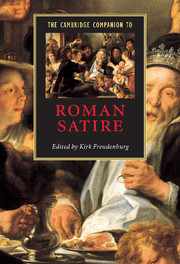Book contents
- Frontmatter
- Introduction
- Part I Satire as literature
- 1 Rome’s first “satirists”
- 2 The restless companion
- 3 Speaking from silence
- 4 The poor man’s feast
- 5 Citation and authority in Seneca’s Apocolocyntosis
- 6 Late arrivals
- 7 Epic allusion in Roman satire
- 8 Sleeping with the enemy
- 9 The satiric maze
- Part II Satire as social discourse
- Part III Beyond Rome
- Conclusion
- Key dates for the study of Roman satire
- Bibliography
- Index
- Series list
5 - Citation and authority in Seneca’s Apocolocyntosis
from Part I - Satire as literature
Published online by Cambridge University Press: 28 May 2006
- Frontmatter
- Introduction
- Part I Satire as literature
- 1 Rome’s first “satirists”
- 2 The restless companion
- 3 Speaking from silence
- 4 The poor man’s feast
- 5 Citation and authority in Seneca’s Apocolocyntosis
- 6 Late arrivals
- 7 Epic allusion in Roman satire
- 8 Sleeping with the enemy
- 9 The satiric maze
- Part II Satire as social discourse
- Part III Beyond Rome
- Conclusion
- Key dates for the study of Roman satire
- Bibliography
- Index
- Series list
Summary
Seneca’s Menippean satire, often entitled Ludus de morte Claudii (“Funning with the death of Claudius”), offers a sort of interlude from the play of the Roman satirists and their critics. Indeed, many features of this branch of satire seem to preclude its being comfortably set alongside Horace, Persius, Juvenal, or even Petronius (which is not to imply that these four are at all comfortable set alongside each other …). While all satirists (sometimes angrily) celebrate their belatedness, their parasitic reliance upon the tropes of earlier genres and their mimicking even of these very celebrations, the Menippean satirist, eschewing indignation, turns to self-conscious mimicry - parody. Within this play of parody is created the image of an author both in control and not in control of the work he calls “his own.” Joel Relihan has elegantly formulated it thus: “Menippean satire, one may say, opposes the word-centered view of the universe, and is a genre that, in words, denies the possibility of expressing the truth in words.” How Seneca positions Roman culture, Roman emperors, and Roman authority within this generic view is the subject of this essay. By reading the Apocolocyntosis as a text engaged in the reception of classical literature, I hope to draw out the extent to which this satire, gleefully after every event, offers to subsequent writers and scholars a mode of expression which is more than just an admission of belatedness. The project of quotation and citation, as pursued in this paper, plays a fundamental role in the creation of classical literature as quotable, as worth alluding to.
- Type
- Chapter
- Information
- The Cambridge Companion to Roman Satire , pp. 95 - 108Publisher: Cambridge University PressPrint publication year: 2005
- 6
- Cited by



